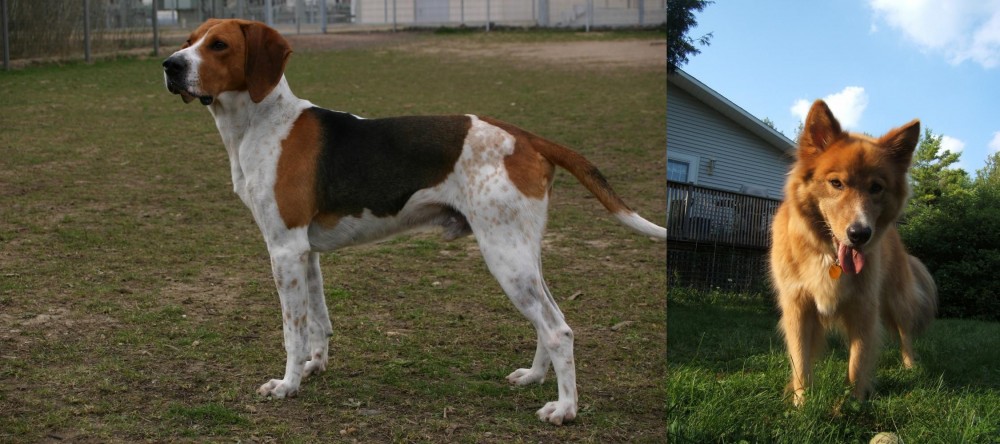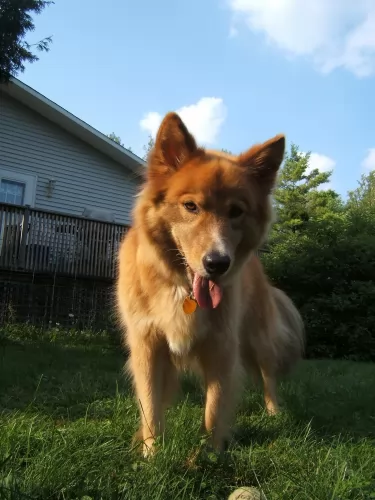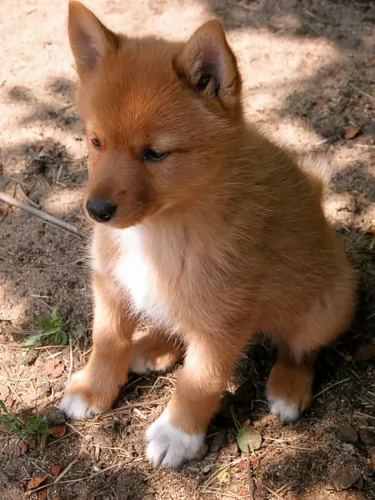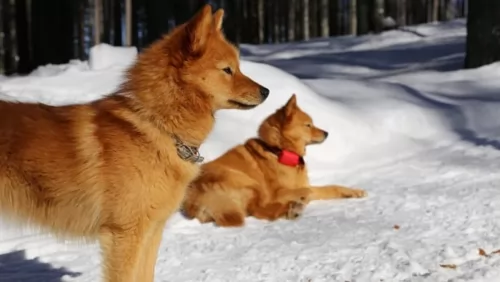 Petzlover
Petzlover Anglo-Francais de Petite Venerie is originated from France but Karelo-Finnish Laika is originated from Russia. Anglo-Francais de Petite Venerie may grow 23 cm / 10 inches higher than Karelo-Finnish Laika. Anglo-Francais de Petite Venerie may weigh 6 kg / 14 pounds more than Karelo-Finnish Laika. Both Anglo-Francais de Petite Venerie and Karelo-Finnish Laika has almost same life span. Both Anglo-Francais de Petite Venerie and Karelo-Finnish Laika has almost same litter size. Both Anglo-Francais de Petite Venerie and Karelo-Finnish Laika requires Low Maintenance.
Anglo-Francais de Petite Venerie is originated from France but Karelo-Finnish Laika is originated from Russia. Anglo-Francais de Petite Venerie may grow 23 cm / 10 inches higher than Karelo-Finnish Laika. Anglo-Francais de Petite Venerie may weigh 6 kg / 14 pounds more than Karelo-Finnish Laika. Both Anglo-Francais de Petite Venerie and Karelo-Finnish Laika has almost same life span. Both Anglo-Francais de Petite Venerie and Karelo-Finnish Laika has almost same litter size. Both Anglo-Francais de Petite Venerie and Karelo-Finnish Laika requires Low Maintenance.
 The Anglo-Francais de Petite Venerie is one of the oldest scent hunting dogs around. A crossbreed between the French Hounds and the English hunting dogs, the Anglo-Francais de Petite Venerie is believed to be an offspring of several famous dogs such as the Beagles, the Poitevins, and the Petit Gascon-Sainttongeois.
The Anglo-Francais de Petite Venerie is one of the oldest scent hunting dogs around. A crossbreed between the French Hounds and the English hunting dogs, the Anglo-Francais de Petite Venerie is believed to be an offspring of several famous dogs such as the Beagles, the Poitevins, and the Petit Gascon-Sainttongeois.
Although the genesis of this dog breed is somewhat unclear, a majority of the sources believe that it was developed in the 16th century at a time when written records of dog breeding never existed. Throughout the 16th to the 17th centuries, the Anglo-Francais de Petite Venerie became a treasured dog breed thanks to the rise of hunting games among European nobles. As the sport thrived in England and especially in France, the need to own the Anglo-Francais de Petite Venerie became paramount leading to this dog breed’s popularity. Formerly known as the Petit Anglo-Francais, this dog breed was changed to its current name in 1978 before being admitted to the United Kennel Club in 1996.
 The Karelo Finnish Laika is a Spitz type hunting dog from the Karelia area of Russia.Some people say the dog developed in Sweden. The dog is from a group of ‘Laika’ breeds and has that typical Spitz-type look – the sharpish face, the erect ears and the tail which curls over the back.
The Karelo Finnish Laika is a Spitz type hunting dog from the Karelia area of Russia.Some people say the dog developed in Sweden. The dog is from a group of ‘Laika’ breeds and has that typical Spitz-type look – the sharpish face, the erect ears and the tail which curls over the back.
This attractive dog was developed as a hunting dog, and has a thick, weatherproof coat.The Karelo-Finnish Laika breed developed because people wanted a smaller sized hunting dog that could cope well with the weather, and these Laika dogs matched well.
The breed is ancient – centuries old, and after dying out in numbers during the second world war, the breed was revived when Russians imported Finnish Spitzes from Finland and bred them. The dog is similar to the Finnish Spitz, and in 2006 the Finnish Kennel Club and Russian Kennel Federation included the Karelo-Finnish Laika as a Finnish Spitz breed.
 The Anglo-Francais de Petite Venerie is a dog breed that resembles a Beagle. Developed in France, this scent hound has served as a hunting dog for centuries making it an athletic breed with unusual characteristics. Their chests are narrow and deep while the heads are smaller as compared to the rest of the body. The eyes are brown and dark while the tails are medium in size. The limbs are tall, straight, and muscular while their steady necks and broad muzzles are an indication that these dogs are surely bred for hunting purposes.
The Anglo-Francais de Petite Venerie is a dog breed that resembles a Beagle. Developed in France, this scent hound has served as a hunting dog for centuries making it an athletic breed with unusual characteristics. Their chests are narrow and deep while the heads are smaller as compared to the rest of the body. The eyes are brown and dark while the tails are medium in size. The limbs are tall, straight, and muscular while their steady necks and broad muzzles are an indication that these dogs are surely bred for hunting purposes.
Since Anglo-Francais de Petite Venerie are athletic dogs, you will, of course, expect their overall weight to be lesser as compared to most other breeds. These dogs have a short, dense coat that’s easy to groom. With a life expectancy of about 13 years, these breeds are generally healthy and quite easy to maintain. The only major problem these scent hounds experience is a hip and elbow dysplasia which will require you to inspect them for injuries upon returning home from their line of duty.
 With his wolf-like appearance, the Karelo Finnish Laika is a sharp, intelligent dog and is the smallest Laika in Russia used for hunting. He stands at about 38–48 cm in height and weighs about 11 - 14 kg.
With his wolf-like appearance, the Karelo Finnish Laika is a sharp, intelligent dog and is the smallest Laika in Russia used for hunting. He stands at about 38–48 cm in height and weighs about 11 - 14 kg.
His coat is a reddish color and the fur is fairly long and coarse with a dense, soft undercoat. He looks like a red fox with his sharp, bright face, his erect ears, black nose and bushy tail which curls over the back.
The Karelo-Finnish Laika is a sweet dog with a quiet character. Whenever you suggest a game for him, he throws his docile side to the wind and becomes highly energetic and animated. He is an active dog and loves nothing more than a game with his human family members.
He is mistrustful of strangers, he tends to bark easily and he is territorial and all these characteristic go towards making him a good watchdog. He is quite prepared to live peacefully alongside other dogs in the home, more so when he has been trained and socialized.
He makes a great friend and pet for families and is more than ready to be loving and loyal to his human family.
 Anglo-Francais de Petite Venerie are non-aggressive, stubborn but tolerable dogs that work well with kids. However, proper training and socialization must be conducted to ensure that these dogs don’t cause harm to your kids.
Anglo-Francais de Petite Venerie are non-aggressive, stubborn but tolerable dogs that work well with kids. However, proper training and socialization must be conducted to ensure that these dogs don’t cause harm to your kids.
The Anglo-Francais de Petite Venerie is not a shy pet. These dog breeds do make a perfect companion especially due to their hunting characteristics. They can get along well with new owners and should be kept with a same-breed companion to reduce nervousness.
When it comes to their adaptability, Anglo-Francais de Petite Venerie are better suited to be working dogs over being kept indoors. They are therefore suited to farm settings or rural areas where there’s vast track of lands to play and exercise.
Finally, the Anglo-Francais de Petite Venerie is not suited to everyone. This is because this dog breed is quite stubborn and unable to follow orders like most indoor pets do.
 The Anglo-Francais de Petite Venerie is known to be a generally healthy dog with very few health concerns. We think the reason why it’s a healthy dog is due to its athletic characteristic and medium-sized body which is not prone to problems as compared to its large-sized contemporaries. However, since this scent hound is a cross-breed between two well-known breeds, there are chances that it might suffer from several health problems that mostly affect closely related breeds. Some of these health issues include;
The Anglo-Francais de Petite Venerie is known to be a generally healthy dog with very few health concerns. We think the reason why it’s a healthy dog is due to its athletic characteristic and medium-sized body which is not prone to problems as compared to its large-sized contemporaries. However, since this scent hound is a cross-breed between two well-known breeds, there are chances that it might suffer from several health problems that mostly affect closely related breeds. Some of these health issues include;
The hip and elbow dysplasia is a skeletal condition that occurs when the hip or elbow joints fail to develop properly. This condition is very painful and is most common in large breeds such as the St. Bernard, Great Dane, and the German Shepherd. Although the main causes of this condition include; poor nutrition, obesity, lack of exercise, and excessive growth, hereditary issues are very common and can’t be ruled out.
Another health condition you need to watch out for is the demodectic mange. An inflammatory disease caused by various types of mites, the mange can become intolerable in case the number of mites inhabiting your dog’s hair follicles become exorbitant. Among the common signs you’ll expect to see include; redness on the skin, alopecia, and problems with the immune system. To tackle this problem, pet owners will need to groom their dogs more often by digging deep into the skin to identify the mites.
Cataract is a normal eye condition that affects the eye lens causing it to lose its transparency resulting in impaired vision and later blindness. Although this condition is viewed as a byproduct of aging, some dog breeds such as the Anglo-Francais de Petite Venerie are most likely to suffer from this health condition. A common treatment for this condition may include; applying eye drops to help prevent inflammation, surgery or treatment of the underlying factor.
 Apart from his good looks, the Karelo-Finnish Laika happens to be a pretty healthy breed and there are no known hereditary health problems with him. Diseases which can affect any dog -
Apart from his good looks, the Karelo-Finnish Laika happens to be a pretty healthy breed and there are no known hereditary health problems with him. Diseases which can affect any dog -
Many large breeds are prone to hip dysplasia. In hip dysplasia, joint problems cause arthritis and pain and eventually lameness. These days, when buying a puppy, people ask breeders about whether the parents were screened for hip dysplasia.
Any dog fed the wrong diet and who isn’t exercised can become overweight. Obesity in dogs is linked to many health problems in dogs. If you’re in doubt about your pet, consult with your vet on the best food for him.
Many dogs are at risk for certain types of cancer, including lymphoma which is cancer of the lymph nodes. When you are brushing your pet, check him for any unusual lumps so that you can catch cancer early.
Dilated cardiomyopathy (DCM) is where the chambers of the heart are stretched out and don't pump blood properly. Sometimes it can go undetected for a while until the dog becomes seriously ill, requiring emergency medical attention. Medications can regulate heart rhythm but there is no cure.
 The Anglo-Francais de Petite Venerie puppies need to be fed with excellent-quality dog food to provide a balanced nutrition for precise growth. For puppies between 8 and 12 months, 4 bowls of food a day will be enough. Puppies ranging from 3 to 6 months old should be given at list 3 meals in 24 hours period. Always feed your puppies with top quality puppy foods to avoid any possible nutritional defects. Dry food mixed with canned food, broth, or water is perfect for puppies.
The Anglo-Francais de Petite Venerie puppies need to be fed with excellent-quality dog food to provide a balanced nutrition for precise growth. For puppies between 8 and 12 months, 4 bowls of food a day will be enough. Puppies ranging from 3 to 6 months old should be given at list 3 meals in 24 hours period. Always feed your puppies with top quality puppy foods to avoid any possible nutritional defects. Dry food mixed with canned food, broth, or water is perfect for puppies.
When your Anglo-Francais de Petite Venerie has reached maturity, it will be best that you feed him once in each day. Always go for the best dog food to ensure that you feed him with proper nutrition. Other meals you can incorporate (but in small quantities) are cooked eggs, fruits, veggies, and cottage cheese.
The Anglo-Francais de Petite Venerie should be fed with excellent-quality food to avoid various health problems such as tooth and bone concerns. Since these breeds are prone to hip dysplasia, regular veterinary check-ups should be observed at all times.
The Anglo-Francais de Petite Venerie is an athletic dog breed that requires regular physical activity to stay in good shape. Following the footsteps of their ancestors, these dogs are hunting dogs despite the fact that some people prefer keeping them indoors as pets. To eliminate boredom, it’s wise that you set aside some time on a daily basis to exercise your dog as well as take a walk down the streets or around the park.
 The Karelo-Finnish Laika is a most attractive looking dog and his thick, double coat will need to be brushed at least twice a week to keep it free from dust, grass and burrs. He sheds throughout the year so this brushing will keep the loose dog hair under control.
The Karelo-Finnish Laika is a most attractive looking dog and his thick, double coat will need to be brushed at least twice a week to keep it free from dust, grass and burrs. He sheds throughout the year so this brushing will keep the loose dog hair under control.
Watch your Karelo-Finnish Laika’s diet as a lean, mean dog can live longer than one who is overfed. Dogs which are overweight are likely to develop joint problems and heart disease.
The quality of food you feed your pet is hugely important. Popping chocolates and peanuts into his mouth because you love him so much will be toxic for him. Apart from his top quality dry kibble, add in some cooked chicken, rice and vegetables as a tasty treat and mix in a little bit of raw meat also when you can.
Exercise for your Karelo Finnish Laika is a key component to prolonging his life, and he absolutely loves games, walks and action all the way. It will keep him in shape, keep him happy and prolong his life.